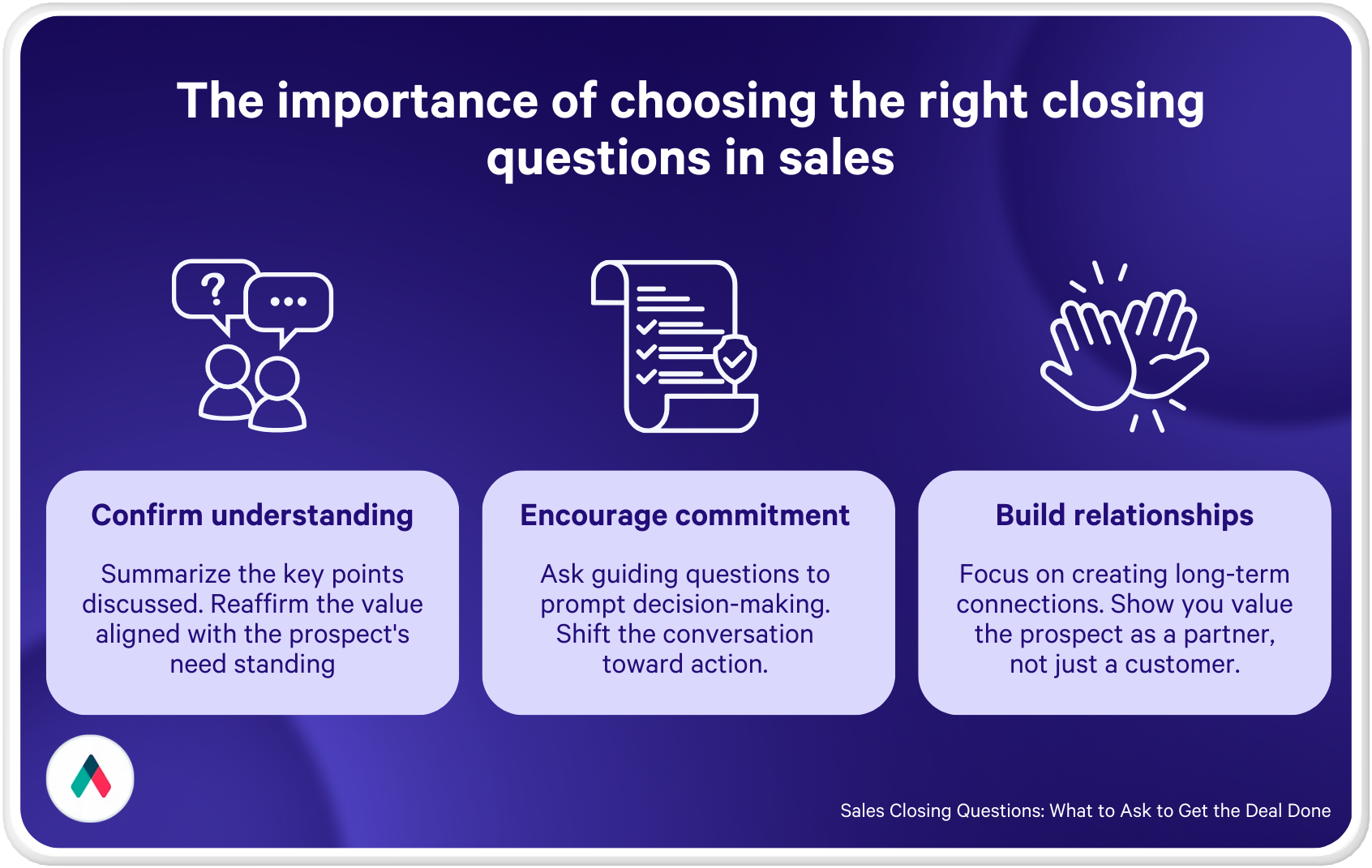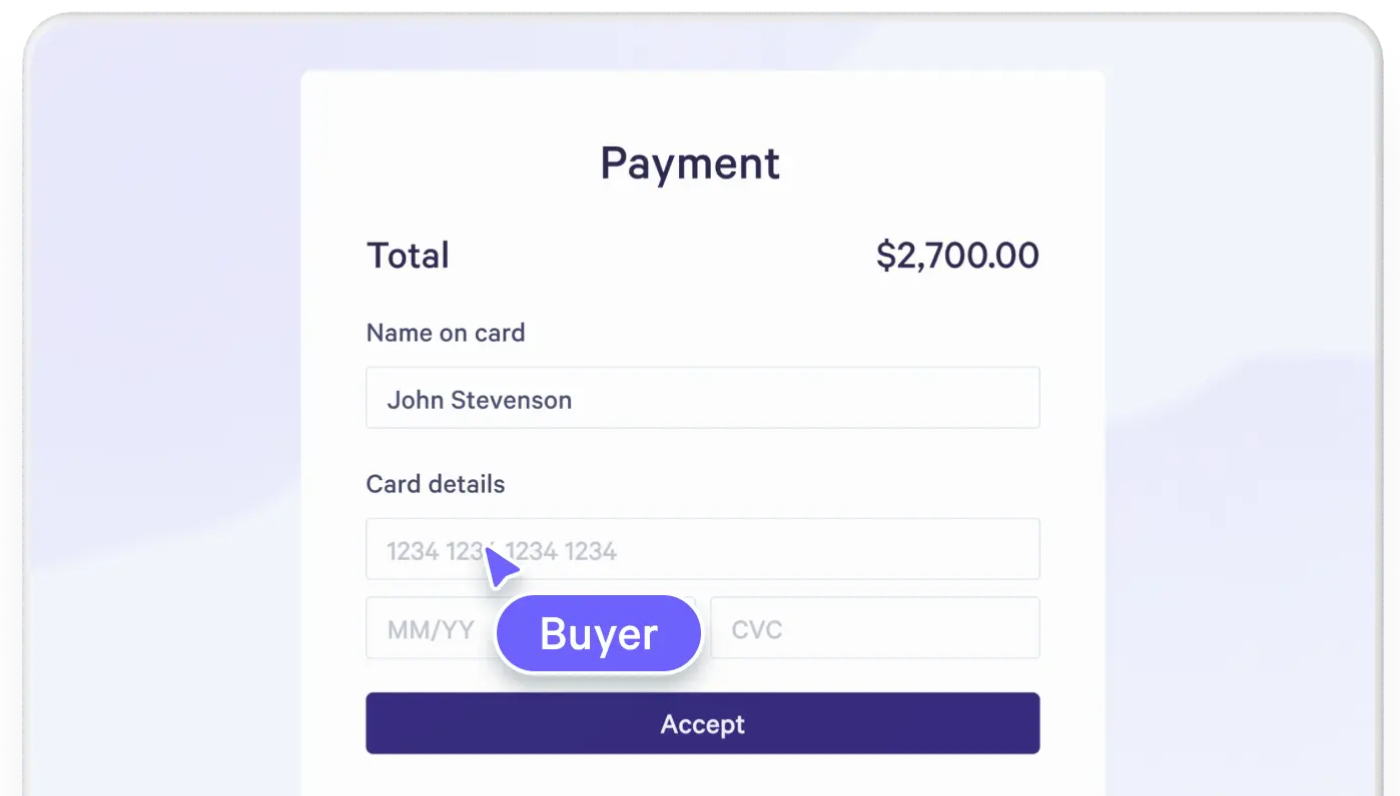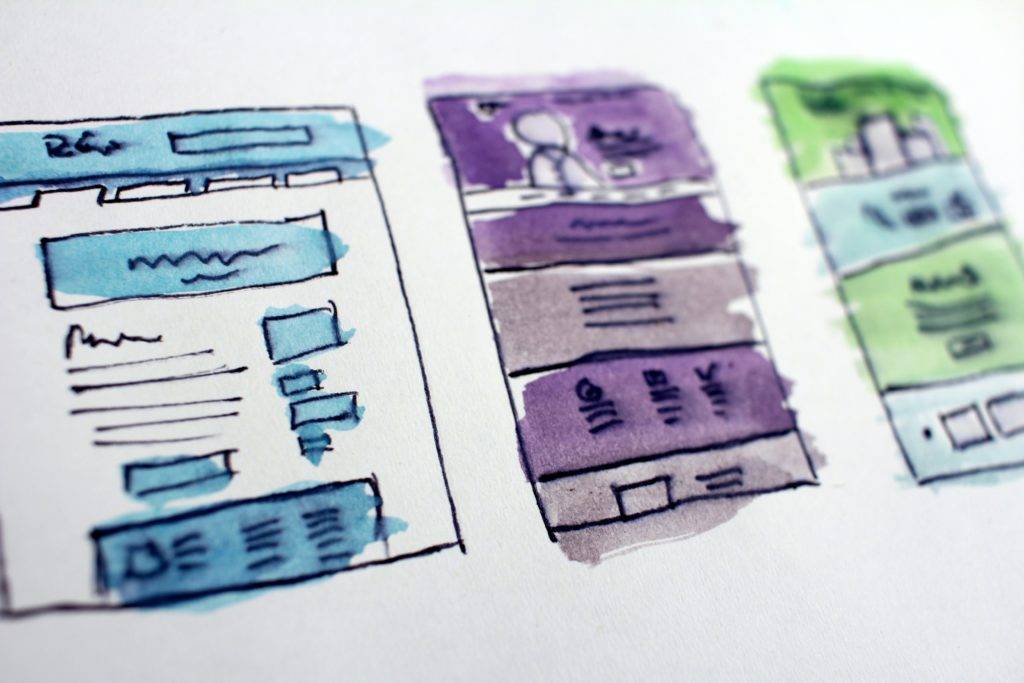
Ever felt that moment of hesitation when you're about to close a deal? That moment of truth, where everything you've discussed converges, and you’re just one question away from a commitment. Your palms start to grease up, and suddenly, your tongue feels a little too big for your mouth. I expect we’ve all been there. (Well, I know I have!)
What if I told you that mastering the close isn’t about high pressure or slick tricks? While a degree of psychology comes into play, it’s more about communication. Asking better and smarter questions.
These questions are not just about finishing a conversation; they're about confirming a partnership, solving a problem, and fulfilling a need—all at the right moment.
We've curated a selection of effective closing questions that can transform your sales process, ensuring your conversations lead to conversions more efficiently.
Key Takeaways
- Tailoring closing questions to the specific needs and context of the customer is essential.
- Closing questions are not just about concluding sales; they also establish and enhance customer relationships.
- Well-crafted closing questions can significantly impact the success of your sales process, affecting both the immediate outcome and the overall buyer experience.
What are closing questions in sales?
Think of them as the key turning point in your sales conversation. These aren't just any questions; they're specifically designed to nudge the potential buyer towards making a decision, to transition from discussion to deal.
These questions come in various forms, but they all serve the same purpose: to get an affirmative nod from your client. Whether it's confirming a client's interest in a feature or checking if they have any lingering doubts, each question is a step closer to sealing the deal. It's about gauging readiness while providing the client with a clear path to saying "yes."
By using the right closing questions, you effectively summarize the benefits of your proposal, reaffirm the value, and address any final concerns—all in one smooth motion. Yes, you’re ushering them toward a sale, but it's also about ensuring their journey- and ultimate decision- is as informed and comfortable as possible.
The importance of choosing the right closing questions in sales
Why put so much emphasis on choosing the right closing questions? It's simple: the right questions can make or break your deal.
Imagine you're at the end of a promising sales meeting. You've discussed features, benefits, and addressed any potential objections. Now, it's the moment of truth. The questions you choose to close with can either cement the deal or leave your prospect hesitating.
These questions should:
- Confirm understanding: Ensure the prospect fully understands the value of what you're offering, summarizing the conversation and reaffirming the benefits tailored to their needs.
- Encourage commitment: Good closing questions gently guide the prospect toward making a commitment. They help shift the conversation from contemplation to action.
- Build relationships: They aren't just about closing a sale; they’re about opening a relationship. The right questions set the stage for future interactions, showing you value the prospect not just as a customer, but as a partner.

Choosing the right questions requires an understanding of your prospect’s needs, emotions, and decision-making process. It’s about reading the room, picking up on the buying signals and knowing when to advance or pull back. This delicate balance is what separates successful closers from the rest.
7 best closing questions in sales
Perfecting your closing questions is crucial for sealing deals with confidence and precision. Here are seven expertly crafted, time-tested closing questions:
1. "Does this solution meet your needs, or is there something else you're looking for?" This question does more than solicit feedback—it strategically places the client in a position of control, encouraging their comfort and candor in expressing any unresolved issues. It’s effective because it reassures the client their needs are paramount, which can alleviate any lingering hesitations and foster a sense of partnership.
2. "If we could find a way to deal with [specific objection], would you be ready to move forward with this?" By pinpointing a specific objection, this directly tackles the biggest barrier to closing. It demonstrates empathy and a proactive approach to problem-solving. The client feels understood and supported, paving the way for a commitment once their concern is addressed.
3. "What would it take for us to get started today?" This forward-looking question assumes the sale in a non-aggressive way and shifts the conversation towards action. It primes the client to think beyond decision-making to the actual implementation, making the purchase feel imminent and real.
4. "Shall we go ahead and schedule the implementation?" This “presumptive close” builds on any positive reactions and momentum established during the sales conversation toward a decision that is the natural, expected progression. (Of course, if they have been humming and hahhing their way through your pitch, you'd be better exploring alternative options or, indeed, circling back to ensure you, have the right product fit).
5. "Can you see how [product/service] would be beneficial in solving [specific problem]?" This powerful reaffirmation technique links the product’s benefits directly to a pain point discussed during the sales process. It's effective because it makes the abstract benefits concrete, enabling the client to visualize the positive impact, thereby increasing the perceived value and urgency of the purchase.
6. "How does this proposal align with your budget expectations?" Discussing the budget openly can be delicate, but this frames it in a way that respects the client's financial constraints while still moving the conversation forward. It addresses potential financial objections upfront and collaboratively, reducing any tension around cost and focusing on fitting within the client's financial framework.
7. "Would you like me to review any points again, or are we ready to proceed?" This question offers a dual pathway: it either clarifies any doubts by reviewing information (thus demonstrating thoroughness and patience) or moves directly toward closure. It positions the close as the next logical step, while still empowering the client to dictate the pace, making them feel more in control and less pressured.
Each of these closing questions is not just a query but a strategic tool designed to guide the conversation toward a successful close. By understanding and employing them, you’ll not just close more deals, you’ll build longer lasting relationships with your clients.
Top tips for closing faster
Closing deals swiftly is a hallmark of efficient sales professionals. Here are some top tips to help you close faster, ensuring your sales process remains both effective and engaging:
Understand the decision-making process
Get to know who makes the purchase decision and the criteria they use to make it. Tailoring your approach to the decision-makers and their specific needs can significantly speed up the closing phase.
Always be preparing to close
A.B.C. “Always Be Closing” was the famous motivational speech by Glengarry Glen Ross. From your first interaction, steer the conversation towards the close. This means aligning your discussions with the end goal in mind, making every point a stepping stone towards this decision.
Create a sense of urgency
Without being pushy, communicate the importance of timely decision-making. Whether it’s a limited-time offer or an upcoming price adjustment, a gentle nudge about the benefits of acting quickly can speed up the closing process.
Simplify the process
Make it as easy as possible for your prospect to say yes. This can mean offering flexible payment options, explaining technical terms or something as simple as handling the paperwork for them. The fewer obstacles in the way, the quicker the close.
Follow up strategically
The timing of your follow-ups can be just as crucial as the follow-up itself. Don’t let your prospects go cold—keep the momentum going with timely and relevant communication that reminds them of your solution’s value.
Final thoughts
Remember, the right questions not only advance the sale but also build lasting, long-term relationships. As you put these insights into practice, consider how tools like Qwilr can streamline your proposal process, making every client interaction smoother and more professional. We have a huge library of sales proposal templates for you to choose from, all easily customizable, with real-time reporting and notifications on who views what and when, freeing up your sales team to hone their craft.
Explore what Qwilr has to offer and take your sales process to the next level. Try it for free today.
About the author

Marissa Taffer|Founder & President of M. Taffer Consulting
Marissa Taffer is the Founder & President of M. Taffer Consulting. She brings over 15 years of sales and marketing experience across various industries to a broad range of clients.
Frequently asked questions
A soft close in sales gently guides your potential customers toward making a decision without applying strong pressure. For example, you might ask, "Would it be helpful if I sent over some more detailed information on this feature for you to review at your leisure?" This keeps the door open for further engagement and eases the prospect into making a commitment.
Trial close questions help determine a prospect's level of interest and readiness to buy throughout the sales conversation. A common trial close question could be, "How does this solution sound for addressing your needs so far?" This prompts the prospect to think about their current stance towards the product or service, allowing you to adjust your sales pitch accordingly.
To avoid pressuring the customer, frame your closing questions in a way that emphasizes flexibility and consideration for their decision-making process. For instance, you might ask, "What timeline would you feel comfortable with for making a decision?" This respects their pace and shows that their comfort is your priority, not just your close.
A great way to reaffirm your product's value at the close is to connect it back to a key benefit that resonates with the client. For example, "Given how important reducing downtime is to you, shall we proceed with setting up the service that ensures this isn't a concern?" This question directly links the product's value to the client's specific needs.
In a casual conversation, a non-intrusive way to steer toward a close might involve subtle suggestions rather than direct questions. You could say something like, "A lot of our clients have found that starting with a trial helps them make an informed decision. Is that something that might work for you?" This approach makes the suggestion feel more a helpful tip rather than a hefty sales push.



